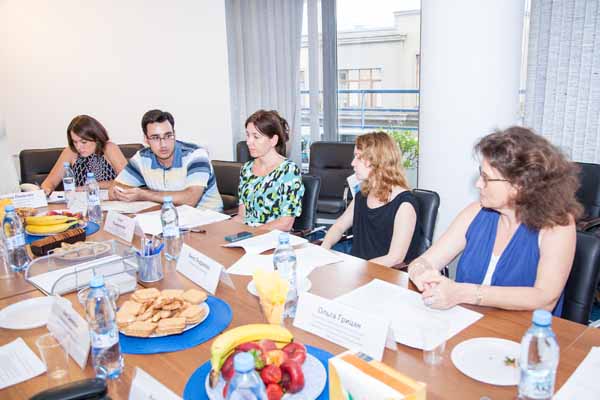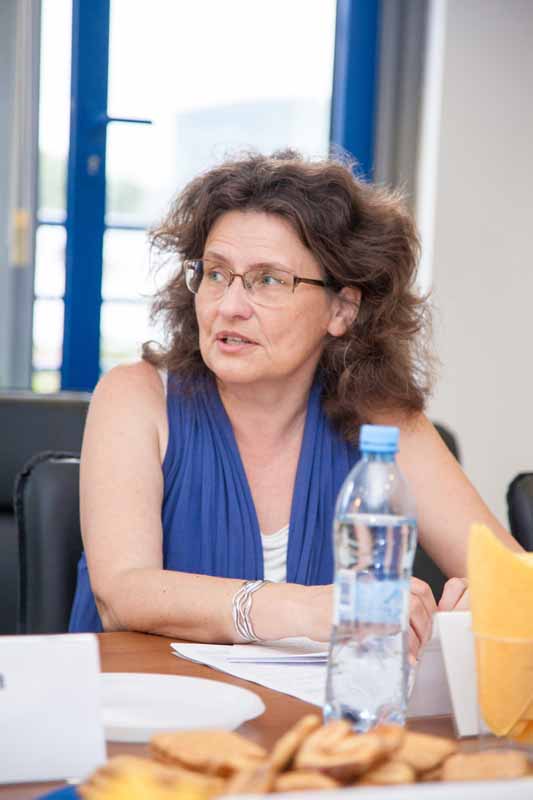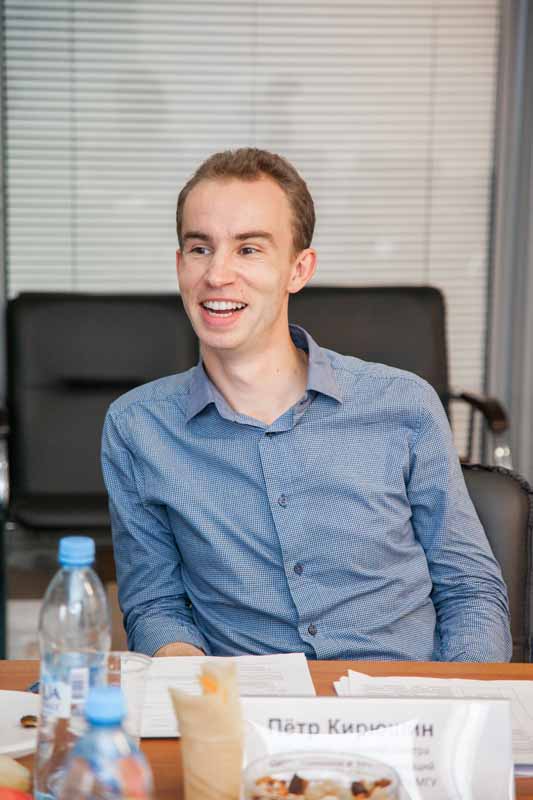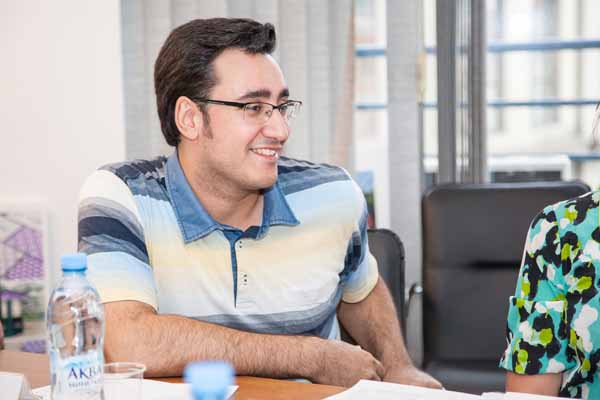Submitted by WA Contents
The Expert Council of the international competition to develop a concept for Sokolniki Park
United Kingdom Architecture News - Aug 16, 2014 - 16:00 3310 views
Experts discussed the process of evaluation of competitive proposals on the 7-th August

Expert Council
Last Thursday, August 7, the organizers and members of the Expert Council of the international competition to develop a concept for Sokolniki Park discussed the methodology and main provisions of the procedure for technical assessment of projects and current approaches to it. Following the discussion, it was decided to supplement the technical assessment process with a head-to-head meeting of the Expert Council and the Organizing Committee for more productive work.
On May 19, 2014, receiving applications for participation in the international open competition for the development of the concept of Sokolniki Park in Moscow was started. The competition was organized by the ArchPolis Center for Territorial Initiatives on order of Sokolniki recreation park, under the authority of Mosgorpark United Directorate.
During the month, approximately 80 applications were received. Of these, just 66 were accepted for consideration by the Jury. The jury examined the applications: at the first meeting held at the Department of Culture in Moscow on 27 June, the top ten finalists were identified from the portfolios and essays of the participants. 10 companies (consortia) from 6 countries, including Russia, China, Britain, the Netherlands, France and Spain, were invited to participate in the second round.
The relevance of the formation of a unified concept of Sokolniki Park is associated with the important cultural and historical role of the park in the development of the capital and modern expectations of its regular visitors. It is not about reconstruction of the park, but just about finding a new vector for its progression, public spaces and recreational areas requiring further development and improvement to meet new requirements of comfort, transport accessibility and level of beautification, said its director, Andrey Lapshin, at a press conference about the international open competition to develop the concept of the park.
Sokolniki Park was created in the nineteenth century. In Soviet times, it was actively developed. In the park, there were large and small rosaries, verandas built for dancing and concerts, libraries and reading rooms, sports infrastructure, an exhibition center and other facilities. In 1979, the park was bestowed the status of a monument of landscape art of the 17-20th centuries, so further transformations of the park were severely limited. In the 1990s, the park actually lost the support of the city authorities, and did not develop. A new period began after 2000, when individual objects of the park began to be restored, and Sokolniki Park was taken over by Mosgorpark United Directorate. In recent years, the park has grown significantly and has been updated. A fitness center appeared, as well as a calligraphy museum, a convention and exhibition centre and dozens of recreation areas. At the same time in the park, the unique atmosphere and planning structure was preserved, which is the main symbol of the park: seven radial cuttings, which run from the central Circleand closed by a cross-section cutting. Several years ago, the park became part of the state program for development of recreation and tourism, which gave impetus to its development. At the moment, it is becoming a modern park, which somehow reflects the symbols and values of our time. Understanding of how a modern park should be should form the basis of the developed concepts. And we, in turn, should try to objectively assess each of the works presented by the contestants that will help us in shaping the concept of development of the park over the next 15 years, explains Sergey Georgievsky, head of the Organizing Committee, and partner of ArchPolis Center for Territorial Initiatives

Olga Gritsan
Sergey Georgievsky reminded the members of the Expert Council that gathered on Thursday evening that the subject of this competition is the development of the framework concept for Sokolniki recreation park, including solutions of urban, landscape, programmatic use of the park, as well as a feasibility study of the proposed solutions. On July 1, 10 competition finalists received the technical specifications and began work on competitive proposals that will be submitted to the Organizing Committee in the period from August 25 to 31, 2014. Technical examination of the proposals will take place on and off-site. Within seven days of receipt from the organizers of the competition proposals (from September 2 to 8), the experts will conduct technical assessment of the works. On September 4, a meeting of the Expert Council for the competition will be held, in which members of the Council will express their arguments in favor of a concept in terms of its section. After that, all the members of the Expert Council will present their findings on the concept and evaluate it with scores (from 1 to 10) on the basis of the requirements of the technical specification. Then, materials and technical assessments will be transferred to members of the jury of the competition, who will decide who will be the winner. At the final meeting of the jury, which will take place on September 16, 2014, competition participants will have the opportunity to present their proposals in person to the members of the jury.

Peter Kiryushin
There was unanimity on most issues presented for discussion among the participants of the last Expert Council meeting, which is rare for such a versatile creative association. Perhaps the only issue that caused heated discussion was the 10-point grading scale, however, the decision on this issue was found fast enough. Olga Gritsan, deputy chair of the jury, head of the park territories department, raised a doubt: Do we need to award an average score, or is it enough to evaluate each component, regulated by the technical specifications and provide a reasoned expert opinion? After a brief consultation, the experts concluded that an average score will not be given, and the work will be assessed by each of them separately, which takes into account the technical specifications, and then a short commentary by item and conclusion - the expert opinion on the project - will be given. Then ArchPolis as the organizer of the competition will take part in the assessment and summarize the comments of experts in some kind of single resume. We understand that all experts' comments are valuable work, which may be very useful in the work of members of the jury, given the very short time, regulating the procedure of technical assessment, said Sergey Georgievsky.

Sergey Georgievsky
By September 16, all views of the members of the Expert Council will be compiled and prepared in the form of printed material. Each member of the jury will receive the final proposals of the participants and the technical report of the competition Organizing Committee, which will include analytical material, expert opinions and commentaries on the proposals according to the technical specifications, so it can be seen how the priorities laid down in the specifications are reflected in the proposals. Members of the jury will also able to make up their minds about a project on the basis of face-to-face presentations by the competition participants.
Organiser of the competition:
ArchPolis Centre for Territorial Initiatives – The ArchPolis Centre for Territorial Initiatives is responsible for managing the Nikola-Lenivets Project (a park for the arts covering 650 ha). The Centre’s research and development work focuses primarily on public space, including a pedestrian zone in the City of Zaraysk, the design concept for a park of historical reconstructions developed by RDI in New Moscow, a pilot “Landscape School” for the Sparrow Hills Nature Reserve in Moscow, and the design concept for Maslenitsa celebrations in Moscow’s Gorky Park. In 2003, ArchPolis launched New Leaders in Territorial Development, an education programme that integrates urbanism, architecture, economics and social sciences. Experience developing public space — especially green space — along with organising and implementing open events has provided valuable preparation for carrying out the Sokolniki Park competition.
The competition is supported by the City of Moscow Department of Culture and the City of Moscow Agency for Parks and Recreation (Mosgorpark).
About Sokolniki:
Sokolniki Park of Culture and Rest is the largest park in Moscow, with a total area of 515.7 hectares. The territory's development into a place of recreation can be traced to the 15th century, when it served as a site for royal falcon hunting. Under Peter the Great it hosted mock battles and folk festivals for nobles and commoners alike. During the 19th century, the park was officially established and equipped with an iconic design that has survived to the present day: seven radial glades extending from the “Circle” to a curved glade that connects their endpoints. Sokolniki Park became one of the most popular areas for summer cottages, many of which were inhabited by musicians, writers and other artists. During the Soviet era, it acquired new landscapes — such as the Large and Small Rose Gardens — along with many other attractions, including verandas for dance, concert stages, libraries with reading rooms, athletic facilities and an exhibition hall. In 1979 it became a protected monument of garden-park design from the 17th through 19th centuries, which substantially limited further transformation. Tracing the park’s evolution reveals its important role in the history of Moscow and of Russia as a whole. Distinct periods in its development are marked by dynamically reconfigured identities of epochal significance. Sokolniki continues to evolve in a manner that reflects important characteristics and values of our time. Conceptual frameworks developed through the present competition should offer compelling visions of what the contemporary park could become.
> via conceptsokolniki.com